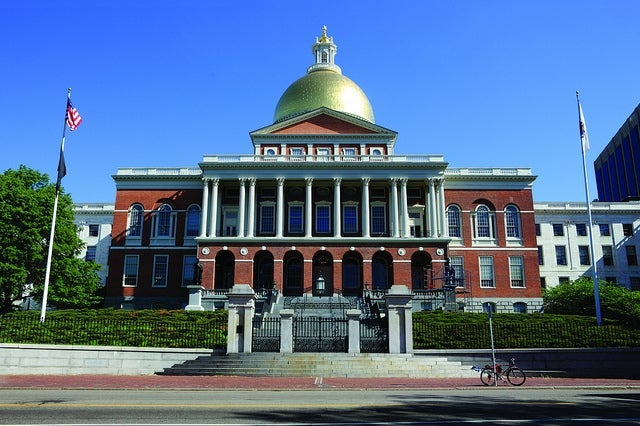A transportation finance bill the House plans to take up Wednesday could serve as a model for an eventual new method of funding road and bridge repairs in Massachusetts, according to one lawmaker.
Along with a new program designed to repair the state’s smallest bridges and authorization of $750 million in highway spending originally proposed by Gov. Charlie Baker in February, the bill (H 4057) includes modifications to a grant program intended to encourage municipalities to make their streets safe for users of various modes of transportation, said Transportation Committee House Chairman William Straus.
The updates to the “Complete Streets” grant program, an initiative that got its start in a 2014 bond bill, aim to “make it simpler for municipalities to access the bond money and make it a little more flexible,” Straus said.
“It was all just a little too much of a bureaucracy to make promoting good design easier to accomplish,” he told the News Service.
A “complete street” might include dedicated bike lanes, a “well-designed bus stop,” median islands and clearly marked crosswalks, Straus said. The Mattapoisett Democrat originally filed the same language as an amendment to the House’s 2017 budget, but withdrew the proposal.
Complete streets policies in seven Massachusetts communities were judged among the best of 82 policies passed in the United States last year, according to a Smart Growth America analysis released in April. Ten Massachusetts communities passed Complete Streets policies in 2015, the most of any state. Ashland, Framingham, Longmeadow, Lynn, Natick, Norwell and Weymouth were ranked in the top ten.
The small bridge program and highway money were originally included in Baker’s Chapter 90 local road funding bill that passed in April.
The bill would create a competitive grant program of $50 million over five years through which cities and towns could apply for funds to repair, build, preserve or improve bridges “with span lengths of no greater than 20 feet.”
“My hope that is that this actually is the seed of a bridge, and someday, road program where municipal roads and bridges will be repaired, dealt with, with state funds but in a competitive application program,” Straus said. “To me this idea is really the start of a different way to approach the non-state road and bridge repair differently from an outright grant program.”
Straus said the need to compete with other applications to win funding could encourage municipalities to work together on bridges that cross town borders.
In March, state Highway Administrator Thomas Tinlin told lawmakers about an increase in the number of small bridges that have fallen into disrepair and are at high risk of full or partial closure because they may not be able to handle vehicle weights and volumes. Tinlin said cities and towns often can’t afford to address fixes to bridges that often span 10 to 20 feet but carry significant volumes of traffic.
Tinlin told the News Service the state began inspecting the state’s nearly 1,300 small bridges a couple of years ago. The inspections convinced transportation officials that a new funding program is needed. He said he believed many bridges in western Massachusetts need attention.
The House will meet in formal session at 11 a.m., with a Democratic caucus planned at noon and roll call votes expected to begin after 1 p.m.

